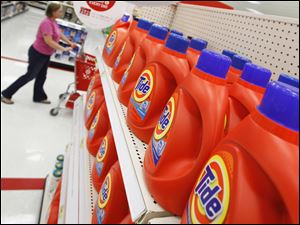
Grocery-price rises further crimp budgets pinched by gas costs
5/1/2011
Tide is among products for which Procter & Gamble plans to boost prices.
CINCINNATI -- Households reeling from gasoline prices above $4 a gallon also face bigger bills for household items.
Producers say they have to raise prices to offset soaring costs for fuel as well as materials and ingredients that go into their products.
The list of companies saying last week that they are raising prices includes Kimberly-Clark Corp. (Huggies diapers, Kleenex facial tissue), Procter & Gamble Co. (Pampers diapers, Tide detergent), Unilever PLC (Dove soap, Ben & Jerry's ice cream), Colgate-Palmolive (toothpaste, soap), and PepsiCo Inc. (soft drinks, Frito-Lay snacks).
Companies have reported better financial results in the past year after cutting prices during the recession to try to retain customers. But many households may have a tough time finding room in their budgets for higher prices.
"There's a fine line that these companies are going to have to work around," said Jack Russo, an Edward Jones analyst. "You've got to be real sensitive to consumers …"
Kim Smith, a Cincinnati restaurant employee and mother of two, said, "Stuff is getting too high; if it gets higher, you won't be able to buy it."
PepsiCo, which is paying higher prices for corn, wheat, and oil, said it will cut its own cost while raising prices but will tread cautiously. "Obviously, in the environment we're in right now, we have to look at these things very carefully," said Hugh Johnston, chief financial officer.
P&G has raised prices for Gillette blades and razors and Duracell batteries, recently announced boosts for Pampers, Bounty paper towels, and Charmin toilet paper, and last week said the summer will bring higher prices for more products including Iams pet food and Head & Shoulders shampoo. P&G said it is also increasing productivity.
Bob McDonald, chairman and chief executive officer, expressed confidence that new versions of products such as Tide laundry detergent will keep shoppers buying big-name brands.
"The best response to slow growth is innovation," he said.
Executives of grocery-store chain Kroger Co. told analysts last week that the company experienced 2 percent grocery inflation in recent months, and they plan to keep passing higher prices from national suppliers through to shoppers.
Safeway Inc., another grocery, said it is "successfully" passing along higher prices.
David Dillon, Kroger's chairman and CEO, explained that the nation's largest grocer thinks high gas prices could have more people taking advantage of Kroger's fuel discounts for frequent shoppers.
And he said the company would be happy for shoppers to trade down to its store brands.
P&G's chief financial officer, Jon Moeller, detailed why the world's largest consumer products company is raising some prices after it reported third-quarter results slightly below analysts' expectations and lowered its projected earnings range for the year.
He said P&G's increased commodity costs are $1.8 billion -- compared with $1 billion projected just two months ago -- with diesel fuel up 25 percent, wood pulp up 10 percent, and resin used in packaging up 15 percent.